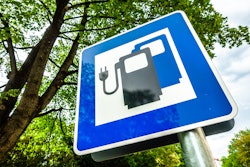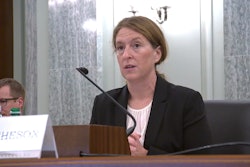Trucking news and briefs for Friday, June 10, 2022:
DOT proposes ground rules for national network of EV chargers
The Biden administration is seeking to formalize the buildout of the budding U.S. electric vehicle infrastructure, which to-date lacks standardization.
The U.S. Department of Transportation’s Federal Highway Administration Thursday announced a Notice of Proposed Rulemaking on proposed minimum standards and requirements for projects funded under the National Electric Vehicle Infrastructure Formula Program. These minimum standards will help ensure a national EV charging network is user-friendly, reliable, and accessible to all Americans (regardless of which OEM EV they drive), and interoperable between different charging companies, with similar payment systems, pricing information, charging speeds and more.
The proposed rule would establish the groundwork for states to build federally-funded charging station projects across a national EV charging network, and complements the NEVI Formula Program Guidance, which encouraged EV chargers be spaced a maximum distance of 50 miles apart along designated alternate fuel corridors by requiring minimum standards for the development of each station.
President Biden’s Bipartisan Infrastructure Law unlocked nearly $5 billion over the next five years under for states to build out a national EV charging network.
Transportation Secretary Pete Buttigieg said these new ground rules will help create a network of EV chargers across the country that are convenient, affordable, reliable and accessible for all Americans. "To support the transition to electric vehicles, we must build a national charging network that makes finding a charge as easy as filling up at a gas station," he said.
The proposed rule is expected to publish in the Federal Register next week.
Senators intro bill to ease TWIC, Hazmat endorsement process
In legislation that mirrors a bill introduced in the U.S. House of Representatives in February, Sens. Roger Wicker (R-Mississippi) and Deb Fischer (R-Nebraska) introduced on May 24 the TSA Security Threat Assessment Application Modernization Act in the Senate, which would standardize the enrollment process for individuals applying for multiple TSA security threat assessment programs.
The legislation, if passed, would allow truck drivers to use one valid Transportation Security Administration background check to enroll in multiple TSA programs, including the Transportation Worker Identification Credential (TWIC) and the hazmat endorsement.
The House bill has not seen any action since it was introduced in February and referred to the House Subcommittee on Transportation and Maritime Security. The Senate bill has been referred to the Senate Committee on Commerce, Science and Transportation.
Walmart updates zero-emission goals progress
In 2020, Walmart set the goal to achieve zero emissions across its global operations by 2040, including its Class 8 transportation fleet.
To make a meaningful impact, Walmart is taking a meaningful approach by evaluating various attributes of three different fuel types -- renewable natural gas, hydrogen and electric. The company is piloting solutions not only for its over-the-road trucks, but also for its refrigerated trailers and yard trucks.
The company said it plans to deploy and evaluate trucks powered by compressed natural gas (CNG), as they have comparable range to diesel engines of around 700 miles and can produce tangible emissions benefits that compound whenever powered by renewable natural gas or RNG-linked fuel.
Starting next year, Walmart will be the first transportation company to receive Cummins’ new 15-liter natural gas engine and will be adding them to a few of its trucks. To maximize the potential benefits of the engines, the company is also partnering with Chevron to supply Walmart trucks with CNG linked to renewable natural gas.
Additionally, the company says in just a few months, it will be the first company in the U.S. to test the capabilities and performance of Capacity’s second-generation hydrogen fuel cell yard truck. The truck is manufactured by Capacity in Longview, Texas, and has a range of expected benefits, including an operating time of up to 10 hours on a single refuel, faster refuel time and less dependence on the electric charging grid, Walmart said.
Finally, as electric vehicles become more mainstream, the company has been exploring where they fit into its fleet. Given the current weight and range capabilities of battery-electric trucks, they’re an attractive solution for yard operations, lighter-weight hauls and day deliveries of around 200 miles, Walmart said.
Walmart has been running zero-emission electric yard trucks in its distribution centers over the last year and found that they provide approximately a 50% reduction in emissions compared to their diesel counterparts. The company has also worked with Thermo King to haul Walmart’s first reefer trailer operated on battery-electricity.
Later this summer, Walmart aims to run a battery-electric day cab proof of concept with Freightliner’s eCascadia and Nikola’s Tre BEV out of a distribution center in Fontana, California. These electric day cabs will be picking up loads from suppliers and delivering them to a consolidation center in the area.
Florida moving company and its owner ordered to pay nearly $22M for deceptive practices
On May 20, 2022, the Seventeenth Judicial Circuit in Broward County, Florida, entered a final judgment as to liability and an order of permanent injunction against All USA Van Lines (doing business as Top Movers Inc.) and its owner Ohad Guzi.
The judgment totaled $21,789,306, including about $5.28 million in restitution imposed under Florida's Deceptive and Unfair Trade Practices Act, and $16.5 million in civil penalties.
According to the Department of Transportation’s Office of Inspector General, the ruling arose from civil complaints the Florida Attorney General’s Office filed in December 2018 against seven individuals and 19 household goods moving companies or their affiliated entities. The moving companies were all located in Broward and Dade Counties.
The complaints alleged that the companies conducted deceptive moving practices by using false or deceptive advertising practices or offering low-price, purportedly binding estimates to entice customers to purchase their services. They then took custody of people’s belongings, raised prices, and forced customers to pay the inflated prices before releasing the goods.
The companies also claimed that highly trained professional or expert movers would perform the services; however, untrained laborers regularly performed the moves, often damaging, destroying, or stealing the customers’ property, OIG said.










